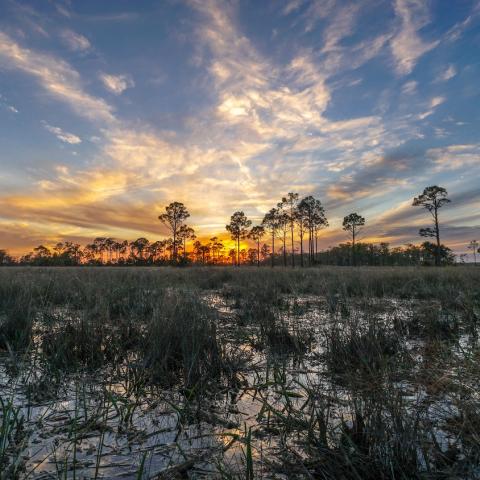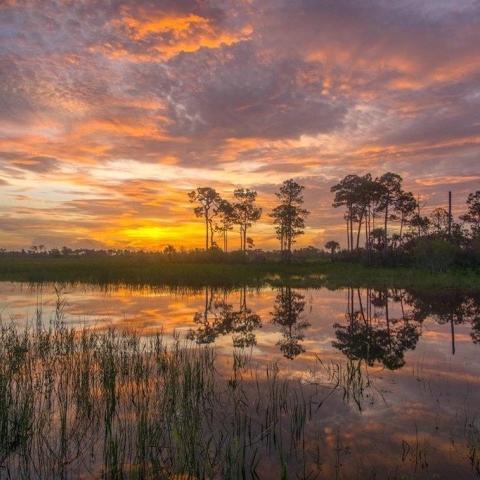This short timelapse video captures some of the bucolic nature of Big Cypress National Preserve in Florida.
Three decades after initial talks were held into the federal government acquiring the mineral rights beneath the surface of Big Cypress National Preserve in Florida, the topic is being raised again, this time with the state of Florida being asked to purchase the rights.
The request (attached below), made by the Natural Resoures Defense Council, Center for Biological Conservancy, Sierra Club, 1,000 Friends of Florida, and cleanenergy.org, comes in the wake of Gov. Ron DeSantis announcement that the state plans to acquire 20,000 acres of Everglades wetlands to prevent oil exploration, and possible development, from occurring there.
“One of my administration’s top environmental priorities has been expediting Everglades restoration,” DeSantis said earlier this month. “Today we take another step in the right direction by reaching this agreement between (Department of Environmental Protection) and Kanter Real Estate that will allow for the purchase of 20,000 acres of critical wetlands. This significant purchase will permanently save these lands from oil drilling."
The governor, who added that "this is just the beginning" of his efforts to protect the river of grass, was beseeched last week to make a similar purchase of the Big Cypress mineral rights. Those rights are owned by the Collier family, which has hired a Texas oil company to search for recoverable reserves in the preserve. While Burnett Oil Co. has done exploratory work on a portion of Big Cypress, no public announcement has been made of what the geologists learned.
The environmental organizations, citing the value of Big Cypress in the Everglades plumbing system, urged the governor to purchase the mineral rights before development could occur.
"Big Cypress National Preserve plays an important role in the Greater Everglades. It comprises 720,567 acres of a water-dependent ecosystem and is the western extension of the Everglades hydrologic system," they wrote. "Water flows on the surface of the preserve in marshes and sloughs and below ground through porous substrate in aquifers. Big Cypress Swamp serves as a significant aquifer recharge area to aquifers that provide drinking water to nearby communities. Notably, the Big Cypress basin provides over 40 percent of the water flowing into Everglades National Park and is a vast hydrologic network—among the least altered remaining in South Florida."
The purchase price for the 20,000 Kanter acres has been reported to range from $16.5 million to $18 million, while past discussions of buying out the Collier family's mineral interests in Big Cypress at one point put the price tag at hundreds of millions of dollars.

Sunset from the Turner River Road in Big Cypress National Preserve/NPS
Back in 1992, a geologist hired by the family "concluded that (Collier Resources Co.)'s mineral interests ... were valued at $472.5 million," an Interior Department investigation noted. Four years later, the federal Minerals Management Service put the value closer to $154.8 million, a figure the agency later reduced to $68 million. In January 2000, the National Park Service, working with the U.S. Geological Survey, lowered the value further, to between $5 million and $20 million.
While there was an attempt during George W. Bush's first term as president to acquire the mineral rights, Congress refused to fund the $120 million deal, which the Interior Department's Office of Inspector General later maintained was wrongly tilted in favor of the company.
According to the OIG report, the negotiations were conducted even though "there was no known oil present." The talks also involved materials provided by Collier Resources but which the company would not warrant as accurate, the report stated, and there were notes indicating that Collier was more interested in being paid for the subsurface rights than in drilling for oil. There also were significant and substantial flaws in the appraisal processes used to try to come up with a value for the company's holdings, according to a third-party evaluation of the work.
Furthermore, a review of four appraisals -- three by the Interior Department and one by the State of Florida -- on the lands acquired for Big Cypress performed for the OIG by the not-for-profit Appraisal Foundation led to an opinion that the subsurface mineral values were taken into consideration when Collier Resources was paid for the surface acres, and so "there would be no basis for any further compensation."
Concerns over what expanded oil exploration -- there have been small wells operating in Big Cypress for years -- might do to the environment were expressed by the South Florida Water Management District in May 1993 when it took a position against exploration in the Everglades.
"The exploratory well and any subsequent production wells will pierce acquifers in the region which include the surficial aquifer system (consisting of the water table and lower tamiami aquifers which contain fresh and brackish quality water used for drinking and irrigation purposes); at greater depths, the well will penetrate the producing zones of the upper and middle Floridian aquifer system (these zones contain brackish water used for reverse osmosis and ASR production purposes); the well, if constructed, will pierce the lower Floridian which is used extensively for disposal of waste waters in south Florida," the water district wrote in a resolution (attached below) opposing oil exploration in the Everglades.



 Support Essential Coverage of Essential Places
Support Essential Coverage of Essential Places







Comments
If you go back in NPT a couple of years, you'll find a couple of articles about the damage caused by the seismic exploration trucks trying to locate oil under Big Cypress. Or, if you are more cynical than I am, you might think that they were trying to blackmail/induce NPS into buying the mineral rights for a speculative price before more damage is done during their legal right of exploration.
https://www.nationalparkstraveler.org/2018/05/oil-survey-leaves-rutted-a...
Unfortunately, tomp2 is very correct. While I'm extremely supportive of purchases designed to support laudable environmental or conservation goals and protecting Big Cypress would certainly qualify, there is a very long history of manipulative miscreants using such goals to extort money out of the federal treasury.
Delaware North famously misused and took advantage of the copyright process to reap millions of dollars in the Ahwahnee caper. In yet another example of how the administration has made a mockery out of federal oversight, the company is still doing business in national parks, thumbing their corporate nose at America. The Caneel Bay scandal seems to be another such scam in the making, as do so many of the "public/private partnership" concessionaire's contract now in favor in the parks. When the NPS budget had been driven low enough and skillful corporate lawyers/accountants, like the ones who filed Delaware North's copyright papers, can make the case that the agency is in enough debt to these predators, the corporations will have won control of the parks and their facilities without firing a shot.
We can also look back on the millions of dollars that were paid to that filthy CUT gang to allow bison to access winter grazing north of Gardiner. In the end, very few bison were actually allowed to use any of the rights for which taxpayers had paid dearly in multiple increments of truly disgusting bait-and-switch corruption.
Many of us can recall that despicable, rightwing supported, parasite, Tom Chapman, who would seek out and gain control over inholdings in designated wilderness and other protected areas and hold them hostage as a means of extracting high ransoms from the federal government to prevent them from being developed into slum lodge operations. I thought he had perhaps gone on to some high management position with Delaware North; but, it looks like he still has or perhaps has resurrected his old gig. I won't even talk, shouldn't need to, about the Nature Conservancy or RMEF, conserving nature for nature's sake ...not.
Mines, like the New World and the more recent example at Emigrant Peak, are a perennial favorites for unscrupulous con artists. They file claims for pennies and then hold out the threat of despoiling the area with their always massive planned excavations as a means of extorting a quick payoff that won't involve any significant actual risk of serious capital. This type of extortion can be especially effective when the risk to the environment also involves the threat of cyanide leach operations. The threat of oil and gas development, like the current situation at Big Cypress, can be almost as effective when paired with either the threat of surface roads and waste ponds or fracking near sensitive or valuable water sources.
Yes, tomp2, it can be an ugly world with the GOP around.
I have mineral rights on a piece of land I inherited. I would love to donate them to the proper/environmentally friendly authorities. Can anyone here help me? Thanks.
You might reach out to the Conservancy of Southwest Florida to see if they can put you in touch with an organization on the mineral rights.